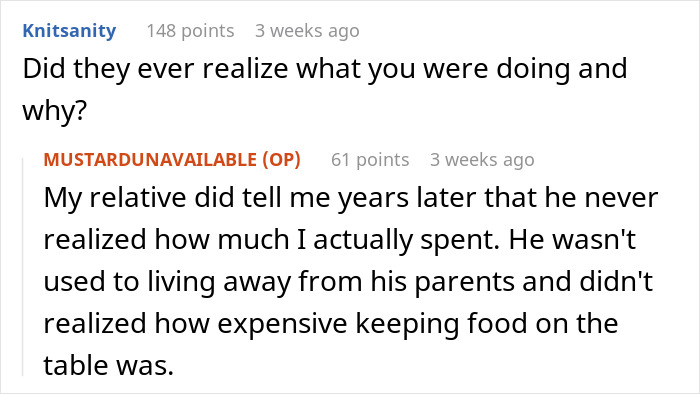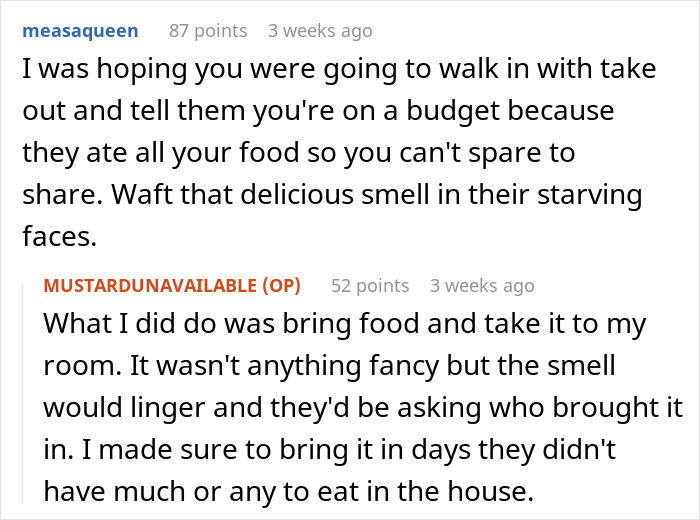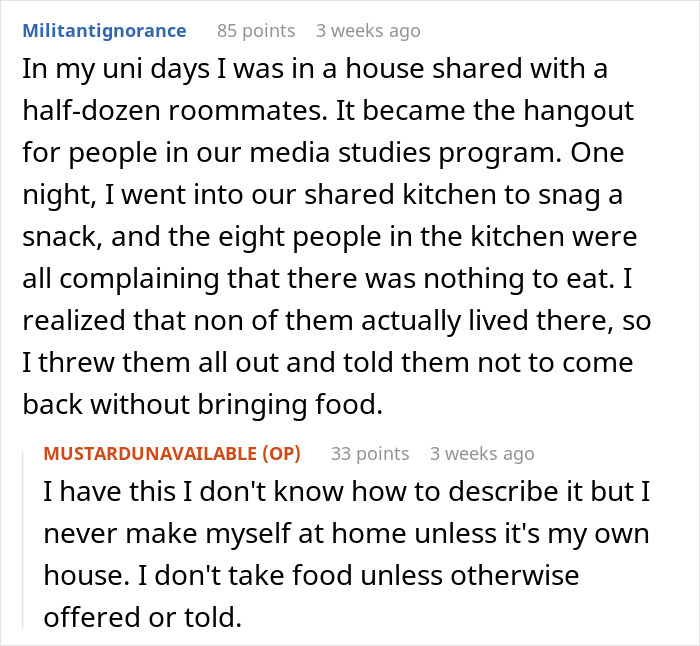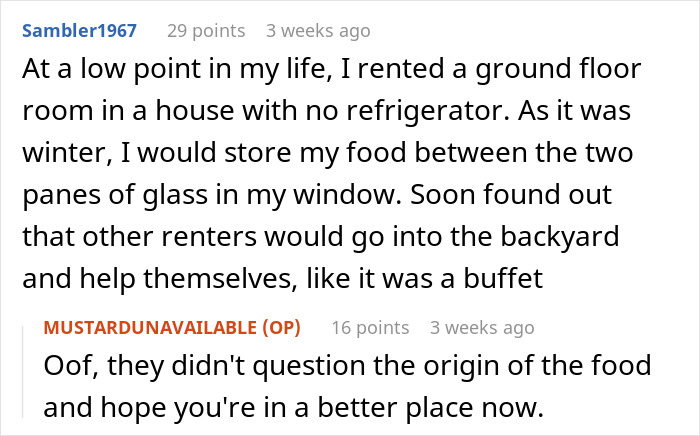The kitchen is the heart of the home, where we make delicious food, nourish ourselves, and connect with others. But when it’s shared with what sometimes can feel like strangers (aka roommates or flatmates), it can quickly become a source of frustration. From splitting groceries to cleaning and sharing the space, there are many things to think about to ensure peace in a shared kitchen.
At first, these guys were fine with the shared kitchen and food situation. But after a month, some roommates started asking a plus-size person not to eat all the groceries as they were trying to save money. They were appalled by such a request since they were the ones buying the food. Therefore, they decided to stop, making other roommates go into full cheapskate mode.
Scroll down to find the full story and conversation with Victoria Murray, LCSW, psychotherapist in private practice at Root to Rise Therapy, and Matt Hutchinson, spokesperson for roommate matching site SpareRoom, who kindly agreed to chat with us more about sharing food and kitchen with roommates.
Ensuring peace in a shared kitchen isn’t as easy as it might seem

Image credits: EyeEm / Freepik (not the actual photo)
And these guys definitely know this, as sharing food quickly became a source of conflict for them








Image credits: EyeEm / Freepik (not the actual photo)





Image credits: MUSTARDUNAVAILABLE
“You need great communication to get along well with your roommates”
Victoria Murray, LCSW psychotherapist in private practice at Root to Rise Therapy, explains that many people find it hard to share spaces with roommates because we like to be in control and don’t always enjoy compromising. “For many of us, we feel like our way of doing things is the “right way”—for example, putting kitchen supplies away in certain places, leaving the toilet seat up or down, organizing the refrigerator in a certain way, etc.,” she said.
“For most things in life, there is more than one “right way” that it can be done. However, we all get stuck into our habits based on how we grew up and what makes us feel most comfortable. When roommates don’t want to do things the same way we do, resentment builds that can negatively impact the relationship and make us more likely to notice other things they do that aggravate us. Especially for people who have not been in romantic relationships or lived with another person before, putting your own values aside to find compromise with another person can be extra challenging,” Murray further explained.
Meanwhile, Matt Hutchinson, spokesperson for roommate matching site SpareRoom, believes the scarce space makes it easy for someone to get wronged, which can quickly become a source of conflict between housemates. “If you get the smallest shelf in the refrigerator, or someone keeps putting their groceries in your cupboard as they’ve maxed out all the space theirs, you’re going to feel hard done by,” he said.
“That means you need great communication to get along well with your roommates and, ideally, this needs to start before you’ve moved in together. It’s worth talking about everything from how you’ll decorate the space, to how often you clean, and at what times you’d like to use communal spaces like the kitchen. Everyone has their individual preferences, habits and routines, and in small spaces these can be harder to follow, so it’s not surprising that disagreements come up, even with the best of roommates.”
If rules are constantly disregarded, it might be best for roommates to go separate ways at the end of the lease
As evident in this story, sharing crucial things like food and kitchen can quickly become a source of conflict with roommates. Therefore, Murray suggests (for not-so-friendly housemates) to divide their groceries and time in the kitchen. “For example, having a schedule for when each person can use the kitchen can help set expectations so that you don’t feel frustrated when you go into the kitchen to prepare a meal and your roommate is using it. The fridge can be divided in sides or using labels on food, unless both people trust each other to know for the most part what is theirs.”
“Most roommates designate cupboard space for each person, as well as a shelf or drawer in the refrigerator and freezer. That way everyone knows what’s theirs and there’s no risk of confusion. Some households designate perishables like milk, bread, fruit and vegetables as shared to limit food waste. To keep bills low, you may want to let each other know if you plan to use the oven, so others can use it while it’s hot rather than reheat it several times,” added Hutchinson.
To avoid any disagreements down the line, roommates should figure out their food and kitchen arrangements before they move in, as having the conversation before there’s a problem is always easier, notes Hutchinson. “Set boundaries and expectations together and communicate house rules to any newcomers before they move in. On SpareRoom, you can state if you’d prefer your roommate to share the same dietary preferences as you, such as being vegan or vegetarian. If food preferences and preparation are important to you, it makes sense to try to find roommates who think similarly.”
Murray also said that roommates should be constantly communicating about any household issues by setting time aside to meet once a month or so. “One person may prefer communicating in person while another may be more inclined to communicate over text—it’s important to know this about the other person so that you can try to approach them in a way that they will be more receptive to when there’s an issue. When things get swept under the rug, resentment builds, and the living environment can quickly start to feel hostile.”
If a certain issue keeps repeating and roommates can’t seem to get on, it’s important to sit down and talk about it in person, said Murray. “Trying to come from a place of understanding and giving the other person the benefit of the doubt can be helpful in having a more productive conversation, instead of attacking or responding defensively. Remember that this is both of your living spaces, and finding solutions to conflict is in both of your best interests.”
However, if rules are being constantly disregarded and both parties are uninterested in finding a solution, Murray suggests it might be best to go separate ways at the end of the lease.
The original poster shared more information in the comments




Readers applauded the OP’s petty revenge







While others also shared similar stories











